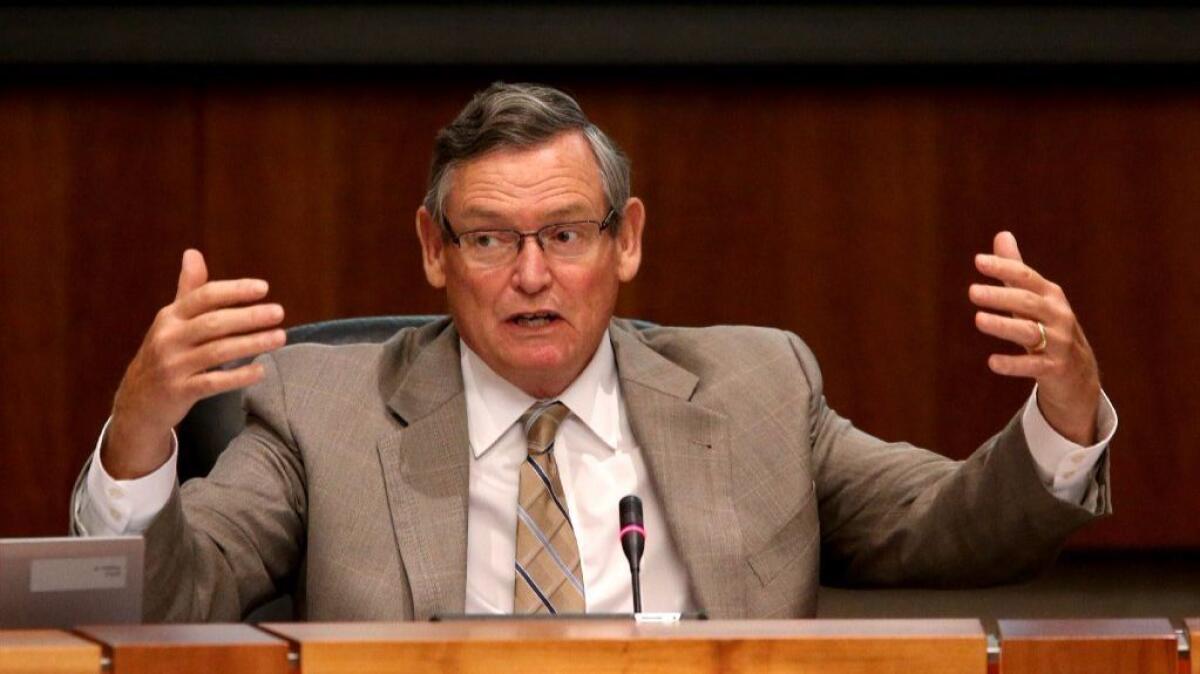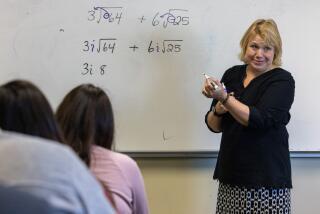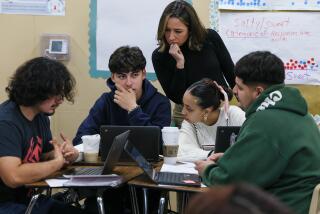Cal State faculty take a stand against ‘hasty’ plans to loosen course requirements

Cal State faculty spoke out Tuesday about what they called “hasty” recent decisions to drop remedial classes and loosen math requirements by next fall.
In a resolution by the university system’s Academic Senate, faculty members said they hadn’t been given enough time to weigh in on what could be “rushed and poorly designed implementation” and should be given at least another year to prepare.
That fact that administrators were moving so fast, the resolution said, suggested that they are “more attuned to the pressures of outside forces than to the needs of its students and continuing faculty efforts to meet those needs.”
The changes, made through executive orders by Chancellor Timothy P. White, are part of a major effort at the nation’s largest public university system to double its four-year graduation rate to 40% by 2025. Last month, White called for dramatic revisions to Cal State’s general education policy, including allowing students to complete the general math/quantitative reasoning requirement by enrolling in courses such as personal finance, game theory, statistics and computer science — courses that do not require the intermediate algebra prerequisite that has stymied thousands of students each year.
Read more: The politics of math: Is algebra necessary to obtain a college degree? »
In a separate executive order, White dropped placement exams in math and English as well as the noncredit remedial courses that thousands of freshmen have been required to take each fall before they are allowed to enroll in courses that count toward their degrees.
White left faculty largely responsible for determining the relevant prerequisites for various math and quantitative reasoning courses, as well as coming up with new and creative curriculum and course models for first-year students.
“The timeline is so blistering fast… it’s mind-numbing,” said Christine M. Miller, chairwoman of Cal State’s Academic Senate. “Since the changes are so big, we think that it is more prudent to slow things down and allow faculty to have the kind of input that they need to have in order to be able to put into place changes that make the most sense.
“Faculty are asking a very important question: Do you want it fast, or do you want it right?” she said.
Many faculty were upset that the changes were announced over the summer, when some of them were away. At their first meeting this fall, they expressed worry about having time to redesign courses and materials, Miller said. Some also said there should be more data-backed analysis.
At the Cal State Board of Trustees meeting, trustee Steven Stepanek requested that a discussion of the “intent and practice” of the executive orders be part of the next meeting in November.
Cal State administrators said they had been talking to faculty at least since March and planned to move forward with the changes on schedule.
“The policy changes… were developed with one key goal in mind: enhancing academic pathways to ensure student success,” Loren Blanchard, executive vice chancellor of academic and student affairs, said in a statement. He said he was confident that administrators and faculty could implement them collaboratively.
The trustees talked about enrollment on the first day of their meeting.
The number of qualified students who want to attend Cal State continues to outpace state support and campus capacity. About 31,000 fully qualified students were turned away for the fall term because their desired campuses had no more room.
Six of Cal State’s 23 campuses — Fresno, Fullerton, Long Beach, San Diego, San Jose and San Luis Obispo — are so popular that every major and program has had more qualified students applying than can be accommodated by faculty, staff and campus resources. All the campuses have such oversubscribed, “impacted programs” in majors such as biology, criminal justice and social work.
On the budget front, trustees broached the subject of possible state funding shortfalls in the next budget. Many were concerned that a tuition increase would once again be seen as a solution. They agreed to talk more in November.
“It’s too soon to be thinking about another tuition increase,” Stepanek said. “I’d like very much if we can take that option off the table for at least this year.”
The trustees will conclude their meeting Wednesday.
The open sessions can be viewed live here.
Follow @RosannaXia for more education news
More to Read
Start your day right
Sign up for Essential California for news, features and recommendations from the L.A. Times and beyond in your inbox six days a week.
You may occasionally receive promotional content from the Los Angeles Times.







